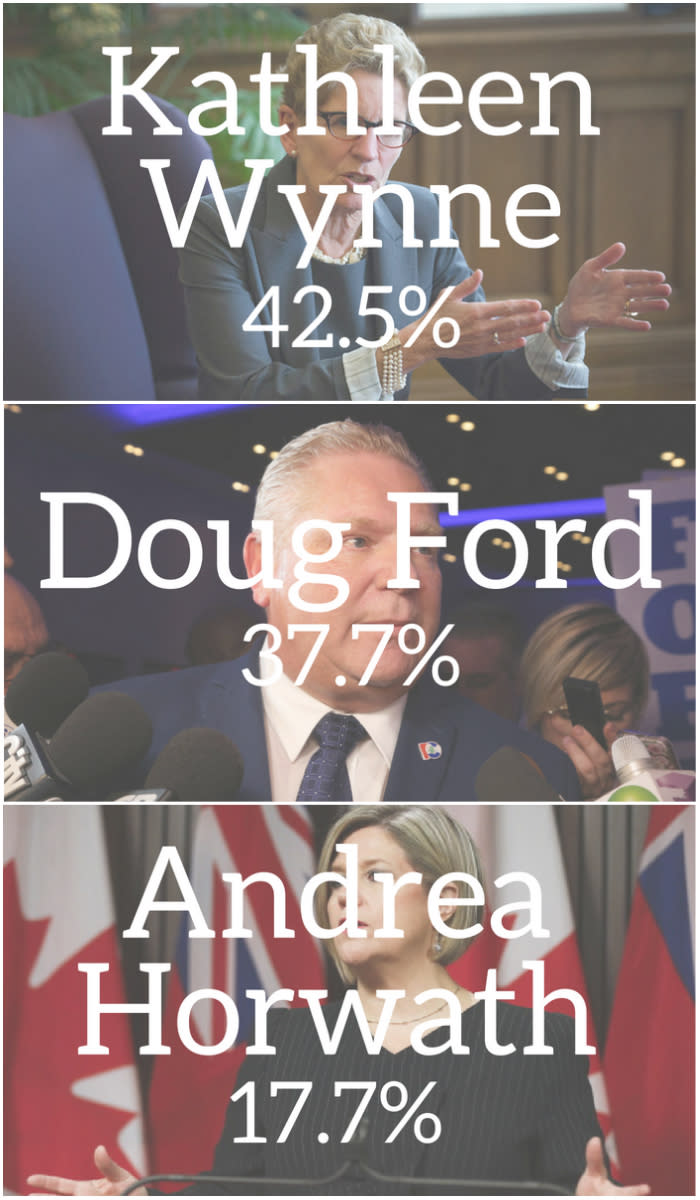Ontario election 2018: The candidate you least want to win

Two weeks out from the 2018 Ontario election, Yahoo Canada News asked readers who they would least like to see elected as premier. More than 11,500 people responded to our poll, and the results are clear and telling.
Most people, 42.5 per cent, said they would least like to see incumbent Liberal Premier Kathleen Wynne elected for another term.
This result isn’t surprising, as Wynne has trailed behind NDP and Progressive Conservative leaders Andrea Horwath and Doug Ford in polls for weeks.
On the Saturday before the June 7 vote, Wynne admitted her party wasn’t going to win the provincial election. She urged voters to still support the Liberals in order to prevent a PC or NDP majority at Queen’s Park.
The sting of rising hydro prices and a privatized hydro utility, coupled with the fact that Ontario has had a Liberal government for 15 years, have many voters ready to part ways with Wynne.
Ford wasn’t far behind, with 37.7 per cent of respondents indicating he’s the person they would least want to see become premier. The controversial leader was forced to defend himself this week after his party released a platform that has been labelled vague and incoherent.
It was Andrea Horwath who fared best, with 17.7 per cent of the votes — a fourth category, “other,” received two per cent.
Horwath had to assure voters this week that Ontario’s New Democrats aren’t anti-police after a photo of a Brampton candidate holding an anti-police sign at a 2006 rally surfaced. But, she seems to have dodged controversy for the most part, and it shows in recent polls.
On May 29, a survey by Pollara Strategic Insights for Maclean’s showed the NDP with 43 per cent of the decided vote, the PCs with 32 per cent, and the Liberals with a meagre 17 per cent. A study released on the same day by Innovative Research Group placed the NDP ahead of the PC by a more modest margin, claiming 36 per cent of the vote to the PCs’ 34 per cent and the Liberals’ 22 per cent.
“This year, the NDP has been very effective at running a campaign that they’re the way to stop the conservatives from winning the election,” said political strategist Jim Warren.
Voting for, or against
As Liberal support continues to collapse across the province, former Liberal voters are planning to spend their votes on PC or NDP candidates in an election that is as much about keeping rival parties out as getting a preferred party in.
“They’re voting against two things instead of voting for one thing,” Warren said of this election’s strategic voters.
This week, the Angus Reid institute actually quantified how strong this trend is in Ontario right now.
According to a report released on May 30, one out of every two voters in Ontario will cast his or her ballot based “not on the party they support, but the one they wish to block.”
While research suggests voters’ choices are driven more by emotion than they might realize, campaign platforms and promises also help parties win elections. In April, Yahoo Canada News asked readers which campaign issues were most important to them.
A quarter of the respondents, 25 per cent, said healthcare was their top priority out of a list of 11. Next were provincial debt, with 15.3 per cent of the votes and government accountability, with 15.2 per cent.
Each party has promised some variation of a free or low-cost dental care program, and while Ford is the only candidate to have vowed to balance the budget while in office, it’s not clear how he plans to do it.
The NDP and PC parties both specifically mention accountability in their platforms, but the first big test for the winning party might not come until Ontarians start to assess how many platform promises were actually kept.
With files from Jonathan Rumley


